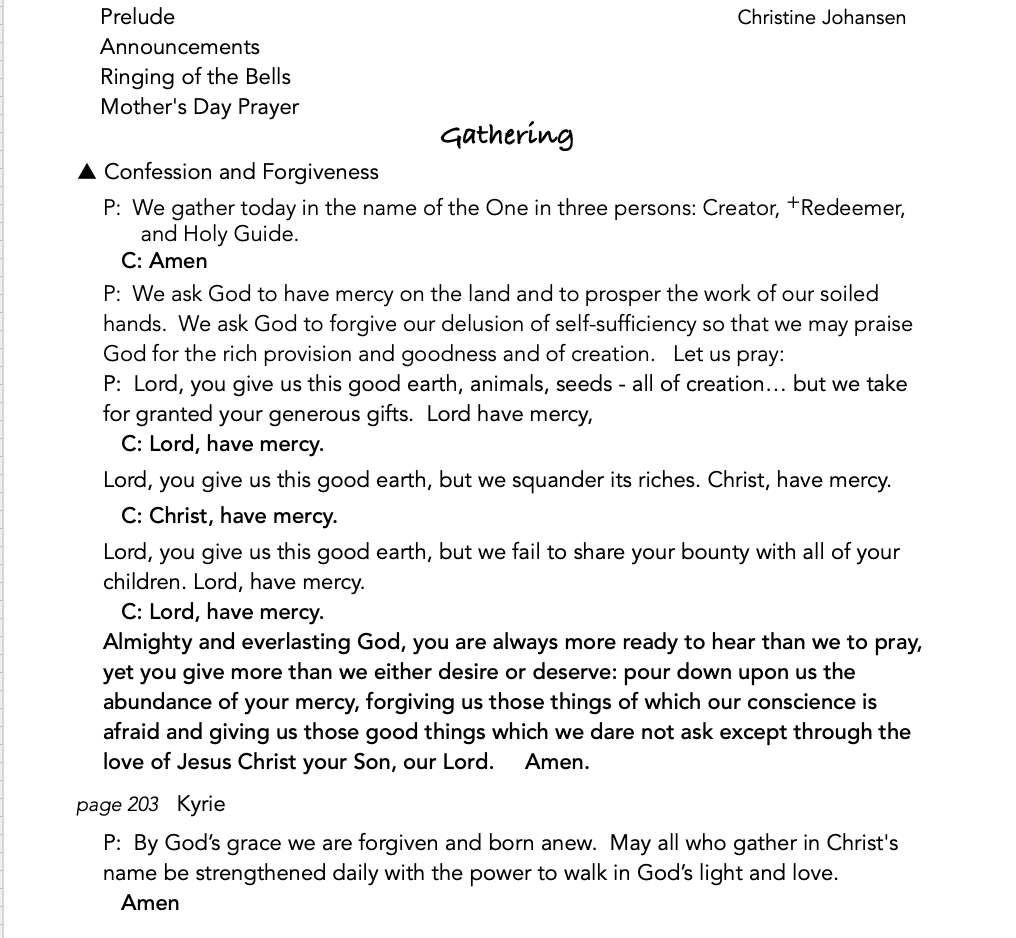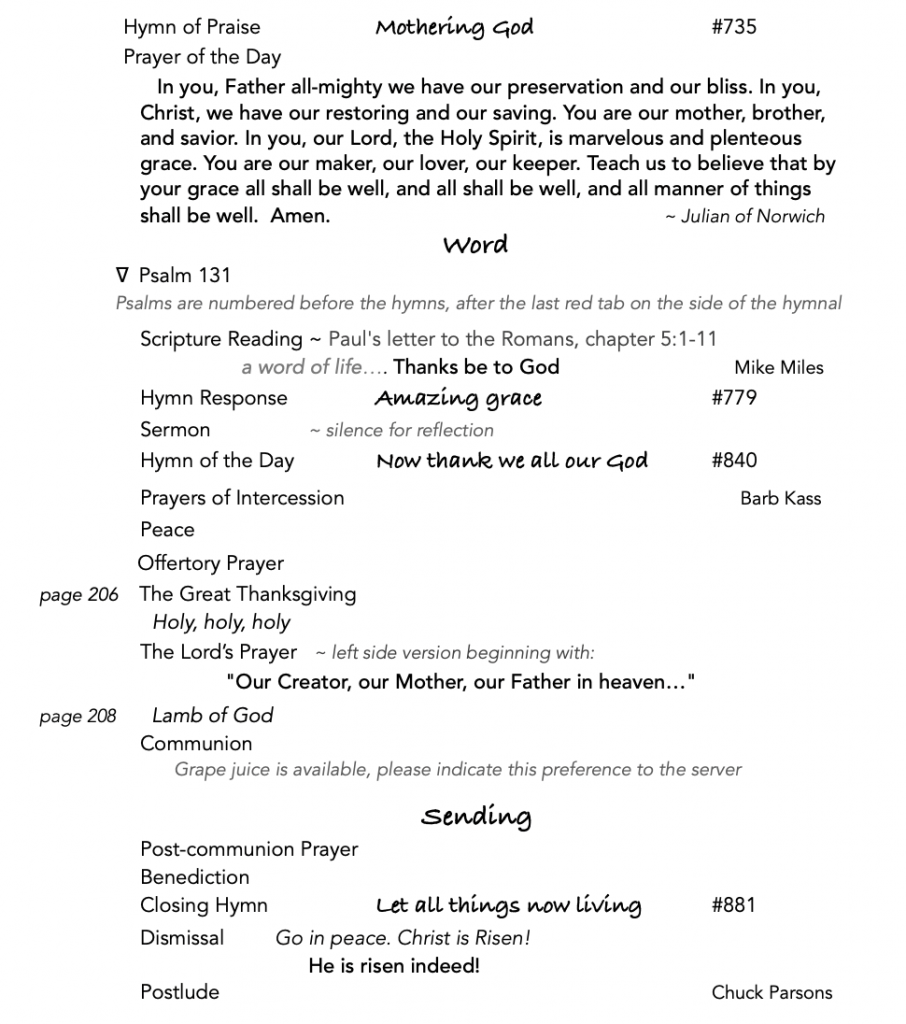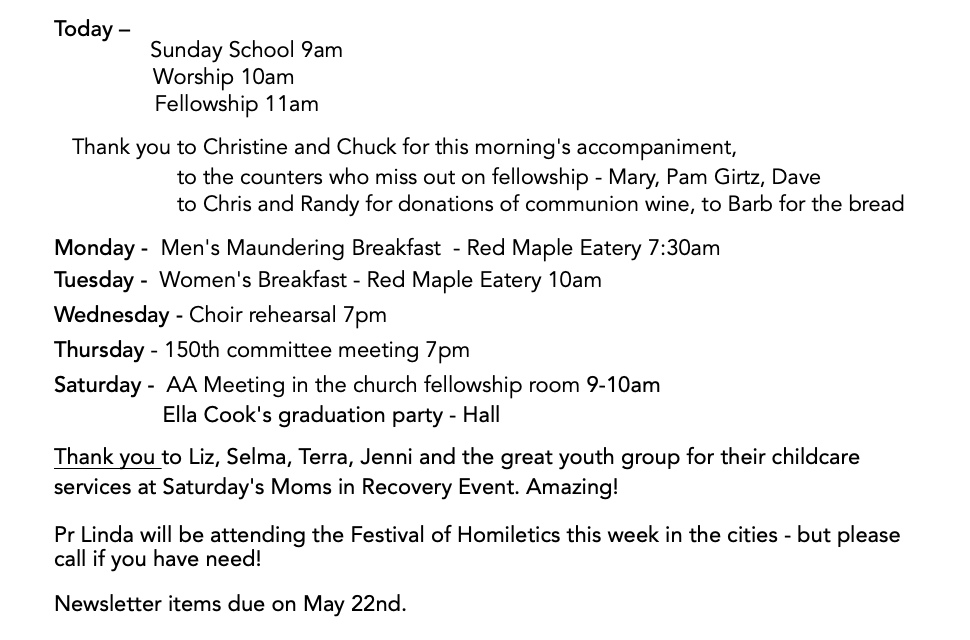Audio Recording


Romans 5:1-11
1 Therefore, since we are justified by faith, we have peace with God through our Lord Jesus Christ, through whom we have obtained access to this grace in which we stand; and we boast in our hope of sharing the glory of God.
3 And not only that, but we also boast in our sufferings, knowing that suffering produces endurance, and endurance produces character, and character produces hope, and hope does not disappoint us, because God’s love has been poured into our hearts through the Holy Spirit that has been given to us.
6 For while we were still weak, at the right time Christ died for the ungodly. Indeed, rarely will anyone die for a righteous person—though perhaps for a good person someone might actually dare to die.
8 But God proves his love for us in that while we still were sinners Christ died for us. Much more surely then, now that we have been justified by his blood, will we be saved through him from the wrath of God. For if while we were enemies, we were reconciled to God through the death of his Son, much more surely, having been reconciled, will we be saved by his life.
But more than that, we even boast in God through our Lord Jesus Christ, through whom we have now received reconciliation.
The word of life….thanks be to God
When someone begins a paragraph with, “Therefore…” we know something has preceded this new thought. We might wonder what the ‘therefore’ is there for…
So, a brief summary of what we’ve missed. Up to this point in his letter to the Christian community in Rome, Paul has been talking about our human condition – that we all – Jews, Greeks, barbarians, gentiles, Romans, Danes – all are bound by Sin and Death with a capital S and a capital D – think cosmic forces, think Roman and Greek and Nordic mythology. We are all subject to the power of Sin and Death and cannot free ourselves.
God, meanwhile, longs for faithfulness and righteousness and goodness from us. God desires our trust and love above all things, love shown toward our neighbors as well as toward ourselves — and we want to, we try to, we mean to….. and then we are distracted by some irritating human, some personal foible, or by greed, or the allure of false loves (of which there are many) and we lose our focus and stumble off the path and wander around lost and fall back under the power of Sin and Death with a capital S and a capital D. And then pick ourselves up, shake off the dust and ashes, and try again.
We know this cycle – it is the storyline of the Old Testament; it is the storyline of human history; and it is the storyline of our lives. Paul himself describes it: 7:15I do not understand my own actions. For I do not do what I want, but I do the very thing I hate.” I bet we could compile a fantastic list of good intentions. See the bulletin cover.
But, also, according to Paul, something has changed. Something has broken into that tragic narrative, something has challenged the power of Sin and Death – some Righteousness with a capital R has come to our side and rescued us, ransomed us from the evil overlord, redeemed us for love and life. And that something is someone – Jesus Christ. Jesus’ faithfulness to God and God’s faithfulness to Jesus through resurrection from death broke the dismal monotony of our human predicament. The Risen One became the means by which we are set free. Through Jesus, we participate in God’s faithfulness and love, no longer subject to “the wrath of God,” (as Paul puts it), but inheritors, sons and daughters of God in good standing.
Therefore, (finally we come back to it), therefore, we have peace with God through our Lord Jesus Christ. Peace with God, and full and free access to this amazing grace in which we stand. Fantastic!
Last week’s sermon was about the righteousness of God. This week’s is about the ‘Therefore‘.
Therefore, we have peace with God.
But, wait a minute. Paul wrote this to the Romans nearly 2000 years ago. In a letter to the Philippians he wrote:4:4Rejoice in the Lord always; again I will say, Rejoice. 5Let your gentleness be known to everyone. The Lord is near. 6Do not worry about anything,… 7And the peace of God, which surpasses all understanding, will guard your hearts and your minds in Christ Jesus.”
In John’s gospel, Jesus says 14:27“Peace I leave with you; my peace I give to you. I do not give to you as the world gives. Do not let your hearts be troubled, do not let them be afraid. My peace be with you.”
‘Peace’ is used 92 times in the New Testament; the phrase, ‘peace with God’, 32 times – most of them in Paul’s letters. But, where is this peace?
Maybe it’s just me. Are you feeling swaddled in the peace of God? If someone asks how you’re doing, do you say, “I’m good. Leaning back on the everlasting arms”?
I mean, that would be good, I just don’t think many of us feel that kind of spiritual calm. In fact, I think anxiety is taking a greater toll than we probably realize.
There’s so much that is not peace in our personal and communal lives, so much busyness, so many distractions and worries large and small. Three young police officers have been shot dead in our rural area in just a few weeks, mass shootings are reported every week in our nation; there is so much anger, so little regard for the sanctity of life, such existential dread layering in as the world turns. We’ve got too much to do and too much to think about before we can experience any peace with God. It sounds unattainable – although we might at least offer a prayer for it… a quick one.
Yesterday’s event at the hall, supporting Mom’s in Recovery, got me thinking about this in a bit of a different way. Jay said that addiction is a spiritual wound, and that when you stop using, the the wound gapes open with nothing big enough to fill it. Without the alcohol or drugs there’s a big empty. And then shame and self-denigration and panic and feeling lost in our own bodies and souls crowds in, and the desire to go back to drinking or using in order to stop the pain overwhelms our intentions and wills and pulls back us into the evil we do not want. Addiction isn’t a habit to break – it’s a broken spirit in need of a new self, in need of peace. It takes something as big as peace with God to bridge the wound, to draw the selvages together, and allow healing.
We don’t need to suffer from an addiction to understand that dynamic. Grief, loneliness, anxiety and depression, retirement, family trauma, chronic overwork – we can probably all find a wound in our lives that is too big for ‘staying calm and carrying on’. A wound in need of redemption, of rest, of nurture, of peace that passes understanding.
I’m attending the Festival of Homiletics everyday this coming week in Minneapolis. The conference’s topic is ‘Preaching hope in a weary world’ – with speakers and famous preachers from all over the country and many denominations — so, it’s a problem recognized throughout the church. We’ll see what they come up with.
But how about you? What does Peace with God look like, or feel like inside of you? Do you have an idea, some wisp of a feeling? Can you remember or imagine a time of deep comfort, of feeling like finally you are fitting the groove, of a big, contented, Ahhh? I hope it won’t increase your anxiety, but ||: I’m going to give us about one minute of silence to try to let some image or memory of profound, deep, abiding peace float to the surface of your awareness. I’ll repeat that so those you who were elsewhere can catch up. Here we go:
What are you picturing, remembering? What images bring you to a truly happy place in your mind’s eye, in your past?
I’m pretty sure I’ve talked about Friendly Valley beach before, it’s where I take myself when I need calm, when I can’t sleep, when I need to picture peace. It’s a sandy reef in Lake Superior between Washburn and Bayfield where the water is so clear you can see the golden rippled sand glinting even when the water is too deep to touch it. The water is pale, the softest of blues, as it meets the horizon beyond the islands. Even on a hot day, the temperature is just survivable, and so you need to acclimate until your blood has retreated to protect vital organs and then softly swush into the water and float, surrendering to the rush of sensations. Looking up into blue dome of the sky and tingling in the effervescence of cold water and cool skin and warm sunshine, every cell of your body is alive and gasping and wondering about this excitement…. and you float on the gentle rhythm of long-travelled waves… and feel the weight of your body dissipate, held aloft in the rising and falling buoyant communion of your own breath and this big water in a balance of body and spirit and trust.
That’s the peace of God to me.
But… if one were to stay there floating in the deep blue peace of Friendly Valley Beach Bay… one would surely die. It is frigid.
And so it is, I imagine, with the images you formed. We can’t live in them. The embrace must at some point end, the chocolate will be consumed, the nursing babe snuggled in your arms will cry and grow and leave home; the amazingly cozy bed will become less comfortable, the golden sun will set, dawn will come … the moment will pass. I would actually love to hear what you have come up with…. Would anyone be willing to share what peace with God feels like, seems like to you?
Peace with God is permanent, forever, theologically speaking – but our experience of it, our participation in it is spotty, temporal. Why do we find peace so oddly absent from our world, from our communities, and, not least, from ourselves? If we know what it is and what it feels like, why is peace the scarcest of commodities?
That is an honest question – I don’t know the answer. Perhaps because it’s too individualistic? Or too fleeting, too unsustainable. It is exhausting to care for all of the people in our realm as we would care for ourselves, to treat all persons with the honor and value they deserve rather than the value we want to assign them, to let God actually direct our lives into fullness and wholeness.
Perhaps also, because this conversation assumes that we love and value ourselves, that we can see ourselves honestly, the way we really are, and can still live with, and love that view.
I would guess that it’s a rare person who can say they are truly at peace with themselves. Most of us prefer to see in a mirror dimly rather than face ourselves eye to eye, to be fully known.
Or perhaps it’s because we confuse God’s love for us with the absence of suffering. I bet none of the images that played in our minds involved times of suffering. And yet, in hindsight, many could point to a time of pain or loss or fear when we felt most convincingly the presence and peace of God, at peace with God.
Our troubles are not a contrary witness to God’s promises. That is the theology of the cross. Even the worst of times may lead us around again to hope. The message is not that Paul and his readers rejoice because they are suffering but rather that they rejoice even in the midst of their suffering. Suffering itself isn’t a cause for rejoicing; but neither is it the opposite of peace.
Later in his letter, Paul writes that ‘nothing can separate us from the love of God.’
“Will hardship, or distress, or persecution, or famine, or nakedness, or peril, or sword?
No, in all these things we are more than conquerors through him who loved us. 38For I am convinced that neither death, nor life, nor angels, nor rulers, nor things present, nor things to come, nor powers, 39nor height, nor depth, nor anything else in all creation, will be able to separate us from the love of God in Christ Jesus our Lord.”
Paul isn’t spiritualizing this, making it about death. Suffering doesn’t separate us from God, because the glory of God is revealed in the cross.
That’s an odd thing when you stop and sit with the words….
The suffering of the cross is the way God has chosen to be present to us in this world. Which is a good thing because there is nothing about life or love that is not suffering – suffering is the norm. Somehow we have developed this idealized image of a pain free life, insulated from the trials and temptations and tedium and rancor of real life. We are not perfect, the world is not perfect, the church is not perfect, so this is the way God has formed us – imperfectly, but growing, resilient, hopeful – characters – one and all.
I read an article on developing resiliency, and it gave the example of growing a flat of seeds. If you start two flats of – tomatoes, let’s say, and put them both in good light, water them adequately, but turn an oscillating fan onto one flat and let the other grow in hothouse peace… The seedlings that were buffeted by the fan will be the stronger, stockier and better rooted plants. They will be the ones capable of bearing the weight of the fruit they produce. Something about the disturbance stimulates a different chemical to be released that strengthens the developing plant.
In humans, too, suffering can lead to resilience and resilience to character and character to hope and hope is good for us – even though suffering is not. I remember a conversation years ago, with Sami Rasouli at Barb and Mike’s. I might have remembered it wrong, but I believe Sami said that in Arabic, the word for suffering is the same word as for journey – that suffering is seen as a journey leading us to a new place and new reality, a new understanding of ourselves and God and the world – and that this suffering / journey word is one of the 99 beautiful names for God, for Allah. The one who suffers, the one who journeys, the one who loves and in love, suffers for us poor earthlings, stuck in the mud and longing for freedom, yearning for love… is God. That is a beautiful name.
The good news is that God doesn’t wait for us. Even before we had faith, while we were yet sinners, while we were still under the thumb of Sin and Death with a capital S and a capital D, God loved us and chose us as inheritors with Christ for all the good, for all the grace, for all the hope in glory.
May the peace of God be with you and abide with you, just as you imagined, now and always, Amen.
